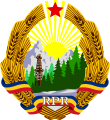The history of Moldova can be traced to the 1350s, when the Principality of Moldavia, the medieval precursor of modern Moldova and Romania, was founded. The principality was a vassal of the Ottoman Empire from 1538 until the 19th century. In 1812, following one of several Russian–Turkish wars, the eastern half of the principality, Bessarabia, was annexed by the Russian Empire. In 1918, Bessarabia briefly became independent as the Moldavian Democratic Republic and, following the decision of the Parliament, united with Romania. During the Second World War it was occupied by the Soviet Union which reclaimed it from Romania. It joined the Union in 1940 as the Moldavian SSR, until the dissolution of the USSR. In 1991 the country declared independence as the Republic of Moldova.

The Warsaw Pact (WP), formally the Treaty of Friendship, Cooperation and Mutual Assistance (TFCMA), was a collective defense treaty signed in Warsaw, Poland, between the Soviet Union and seven other Eastern Bloc socialist republics of Central and Eastern Europe in May 1955, during the Cold War. The term "Warsaw Pact" commonly refers to both the treaty itself and its resultant military alliance, the Warsaw Treaty Organization (WTO). The Warsaw Pact was the military complement to the Council for Mutual Economic Assistance (Comecon), the economic organization for the Eastern Bloc states.
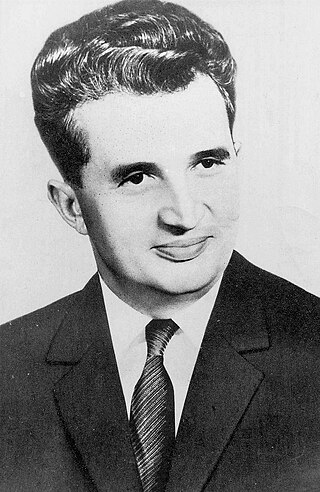
Nicolae Ceaușescu was a Romanian communist politician who served as the general secretary of the Romanian Communist Party from 1965 to 1989. He was the second and last communist leader of Romania. He was also the country's head of state from 1967 to 1989, and widely classified as a dictator, serving as President of the State Council and from 1974 concurrently as President of the Republic, until his overthrow and execution in the Romanian Revolution in December 1989, part of a series of anti-communist uprisings in Eastern Europe that year.

"Limba noastră" is the national anthem of Moldova. It has been used since 1994 and was officially adopted on 22 July 1995.
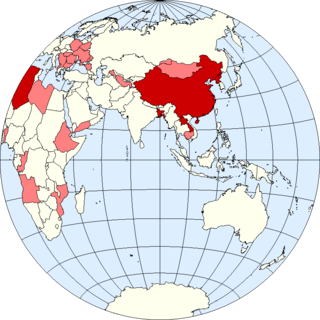
People's republic is an official title that is mostly used by current and former communist states, as well as other left-wing governments. It is mainly associated with soviet republics, socialist states following the doctrine of people's democracy, sovereign states with a democratic-republican constitution that usually mentions socialism, as well as some countries that do not fit into any of these categories.

The Moldavian Soviet Socialist Republic or Moldavian SSR, also known as the Moldovan Soviet Socialist Republic, Moldovan SSR, Soviet Moldavia, Soviet Moldova, or simply Moldavia or Moldova, was one of the 15 republics of the Soviet Union which existed from 1940 to 1991. The republic was formed on 2 August 1940 from parts of Bessarabia, a region annexed from Romania on 28 June of that year, and parts of the Moldavian Autonomous Soviet Socialist Republic, an autonomous Soviet republic within the Ukrainian SSR.
"Three Colors" was the national anthem of the Socialist Republic of Romania from 1977 to 1990. On 24 January 1990, after the Romanian Revolution, it was officially replaced by the current anthem „Deșteaptă-te, române!”. Before 1977, the country's national anthem was „E scris pe tricolor Unire”, whose melody is the same as that of the Albanian national anthem.

”Moldova Sovietică” was the regional anthem of the Moldavian Soviet Socialist Republic, a constituent republic of the Soviet Union.

The Western Bloc, also known as the Capitalist Bloc, is an informal, collective term for countries that were officially allied with the United States during the Cold War of 1947–1991. While the NATO member states, in Western Europe and Northern America, were pivotal to the bloc, it included many other countries, in the broader Asia-Pacific region, the Middle East, Latin America, and Africa with histories of anti-Soviet, anti-communist and, in some cases anti-socialist, ideologies and policies. As such, the bloc was opposed to the political systems and foreign policies of communist countries, which were centered on the Soviet Union, other members of the Warsaw Pact, and usually the People's Republic of China. The name "Western Bloc" emerged in response to and as the antithesis of its Communist counterpart, the Eastern Bloc. Throughout the Cold War, the governments and the Western media were more inclined to refer to themselves as the "Free World" or the "First World", whereas the Eastern bloc was often referred to as the "Communist World" or less commonly the "Second World".

Moldovans, sometimes referred to as Moldavians, are a Romanian-speaking ethnic group and the largest ethnic group of the Republic of Moldova and a significant minority in Romania, Italy, Ukraine and Russia. There is an ongoing controversy, in part involving the linguistic definition of ethnicity, over whether Moldovans' self-identification constitutes an ethnic group distinct and separate from Romanians, or a subset. The extent of self-identification as Romanians in the Republic of Moldova varies.

"Trăiască Regele", also known as the "Imnul Regal", was the national and royal anthem of the Kingdom of Romania between 1884 and 1948. The music was composed in 1861 by Eduard Hübsch, an army captain who later became the chief of the music department of the Minister of War. The lyrics were written by the Romanian poet Vasile Alecsandri in 1881, when Romania became a Kingdom.
"Zdrobite cătușe" was the national anthem of the Romanian People's Republic between 1948 and 1953. The lyrics were written by Aurel Baranga and the music by Matei Socor.

Moldovenism is a term used to describe the political support and promotion of a Moldovan identity and culture, including a Moldovan language, independent from those of any other ethnic group, the Romanians in particular. It is primarily used as a pejorative by the opponents of such ideas as part of the wider controversy over ethnic and linguistic identity in Moldova.
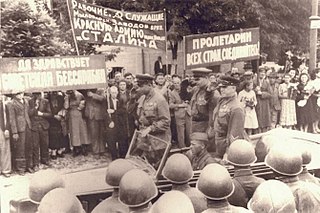
Between 28 June and 3 July 1940, the Soviet Union occupied Bessarabia and Northern Bukovina, following an ultimatum made to Romania on 26 June 1940 that threatened the use of force. Those regions, with a total area of 50,762 km2 (19,599 sq mi) and a population of 3,776,309 inhabitants, were incorporated into the Soviet Union. On 26 October 1940, six Romanian islands on the Chilia branch of the Danube, with an area of 23.75 km2 (9.17 sq mi), were also occupied by the Soviet Army.

A controversy exists over the national identity and name of the native language of the main ethnic group in Moldova. The issue more frequently disputed is whether Moldovans constitute a subgroup of Romanians or a separate ethnic group. While there is wide agreement about the existence of a common language, the controversy persists about the use of the term "Moldovan language" in certain political contexts.

Ovid S. Crohmălniceanu was a Romanian literary critic and science fiction writer.

Suceava Region was an administrative-territorial division located in the northeastern part of the Romanian People's Republic, established in 1950, when the counties were abolished. It existed until 1968, when the regions were abolished.
"Pe-al nostru steag e scris Unire" is a Romanian patriotic song dedicated to the United Principalities of Moldavia and Wallachia established in 1859. The text was written by Andrei Bârseanu and the music was composed by Ciprian Porumbescu in 1880. Its tune is now used in the Albanian national anthem. The anthem of the Dutch city of Maastricht bears considerable similarity to it, though it is unknown if Guus Olterdissen or his brother, Alfons, knew the tune.
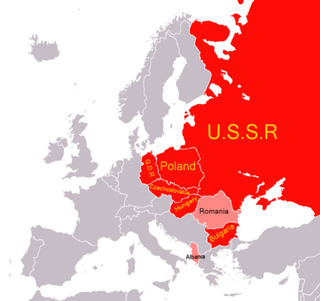
The de-satellization of the Socialist Republic of Romania from the Soviet Union was the release of Romania from its Soviet satellite status in the 1960s. The Romanian leadership achieved the de-satellization partly by taking advantage of Nikita Khrushchev's errors and vulnerabilities. Romania's independence was tolerated by Moscow because its ruling party was not going to abandon communism. Although Romania remained a member of both the Warsaw Pact and Comecon, it was not to be a docile member of either.
Events from the year 1955 in Romania. The year saw the country join the United Nations and Warsaw Pact, the latter as a founder. Amongst notable people who died during the year was composer George Enescu.
